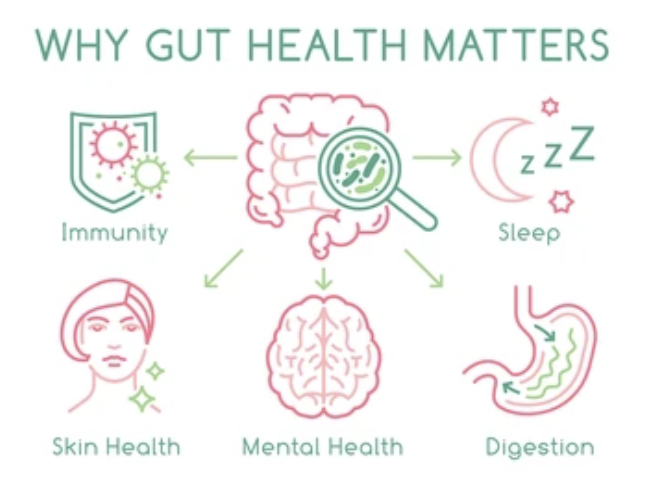 The human body is a complex and interconnected system where each organ plays a vital role in maintaining overall health. Among these organs, the gut – specifically the gastrointestinal tract – stands out as a crucial player. Not only does it facilitate digestion and nutrient absorption, but emerging research also highlights its significant impact on overall health and well-being. This article explores the intricate relationship between gut health and overall health, shedding light on the role of the gut microbiome, the gut-brain axis, and the importance of maintaining a healthy gut for a balanced and thriving life.
The human body is a complex and interconnected system where each organ plays a vital role in maintaining overall health. Among these organs, the gut – specifically the gastrointestinal tract – stands out as a crucial player. Not only does it facilitate digestion and nutrient absorption, but emerging research also highlights its significant impact on overall health and well-being. This article explores the intricate relationship between gut health and overall health, shedding light on the role of the gut microbiome, the gut-brain axis, and the importance of maintaining a healthy gut for a balanced and thriving life.
The Gut Microbiome: A Diverse Ecosystem
The gut microbiome is a diverse collection of trillions of microorganisms, including bacteria, viruses, and fungi, residing in the gastrointestinal tract. These microorganisms play a critical role in maintaining gut health and have a profound impact on overall health. A balanced and diverse gut microbiome is associated with improved digestion, absorption of essential nutrients, and a strong immune system.
Recent studies have shown that imbalances in the gut microbiome, known as dysbiosis, can lead to various health issues. Dysbiosis is linked to conditions such as irritable bowel syndrome (IBS), inflammatory bowel disease (IBD), and even obesity. Furthermore, the gut microbiome’s composition has been connected to mental health conditions like depression and anxiety, highlighting the gut’s influence on the mind.
The Gut-Brain Axis: The Bi-Directional Communication
The gut-brain axis is a bidirectional communication system between the gut and the brain. This complex network involves hormonal, neural, and immunological pathways that allow the gut and brain to communicate with each other. This connection provides a scientific explanation for the “gut feeling” or “butterflies in the stomach” sensations we experience during emotionally charged moments.
The gut-brain axis plays a crucial role in regulating mood, behavior, and cognitive function. Studies have found that an unhealthy gut can contribute to mood disorders and conditions such as depression and anxiety. Conversely, chronic stress and negative emotions can lead to gut issues like irritable bowel syndrome (IBS) and other gastrointestinal disorders.
Immune System and Gut Health
Approximately 70% of the body’s immune system resides in the gut. A healthy gut lining, aided by beneficial gut bacteria, acts as a barrier against harmful pathogens, toxins, and allergens. It helps prevent their entry into the bloodstream, ultimately reducing the risk of infections and autoimmune diseases.
When the gut lining is compromised due to poor gut health, it can lead to a condition called leaky gut syndrome. In this condition, the intestinal barrier becomes permeable, allowing unwanted substances to pass through, triggering inflammation and immune responses. Leaky gut has been associated with various health problems, including chronic fatigue syndrome, allergies, and autoimmune diseases like rheumatoid arthritis and celiac disease.
Nutrient Absorption and Gut Health
The gastrointestinal tract is responsible for breaking down food and extracting essential nutrients necessary for the body’s proper functioning. A healthy gut with a balanced microbiome ensures optimal nutrient absorption, which directly impacts overall health.
On the other hand, an imbalanced gut microbiome can hinder nutrient absorption, leading to nutrient deficiencies despite a seemingly healthy diet. Malabsorption can result in a host of health issues, such as fatigue, weakened immunity, and impaired cognitive function.
Maintaining a Healthy Gut
Given the substantial influence of gut health on overall well-being, it’s essential to take steps to maintain a healthy gut:
- Balanced Diet: Consume a diverse range of whole foods, including fruits, vegetables, whole grains, and lean proteins. High-fiber foods promote a healthy gut environment.
- Probiotics and Fermented Foods: Incorporate probiotic-rich foods like yogurt, kimchi, sauerkraut, and kefir into your diet. Probiotics support the growth of beneficial gut bacteria.
- Prebiotic Foods: Consume prebiotic-rich foods like garlic, onions, leeks, and bananas. Prebiotics serve as food for the beneficial gut bacteria, encouraging their growth.
- Manage Stress: Chronic stress can disrupt the gut-brain axis and negatively affect gut health. Engage in stress-reducing activities like meditation, yoga, or spending time in nature.
- Avoid Antibiotics Overuse: Antibiotics can disturb the gut microbiome, so use them judiciously under the guidance of a healthcare professional.
- Stay Hydrated: Drinking an adequate amount of water supports digestion and helps maintain a healthy gut lining.
The growing body of research on gut health underscores its critical role in shaping overall health and well-being. From the gut microbiome’s influence on digestion and immunity to the gut-brain axis’s impact on mental health, the gut plays a central role in maintaining a harmonious body-mind connection. By prioritizing a balanced diet, managing stress, and supporting the growth of beneficial gut bacteria, we can optimize our gut health and pave the way for a healthier and happier life.




